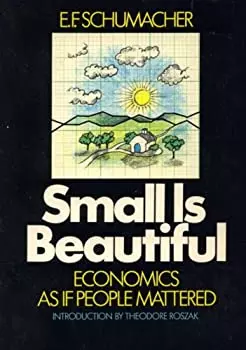In an age when corporations are gargantuan, not merely huge, I have been thinking of E.F. Schumacher and the themes he addressed in his very influential- for me- 1973 book Small Is Beautiful: A Study of Economics As If People Mattered.
The Thesis
Schumacher, who was influenced by Gandhi, Buddha and others, covered a lot of ground in Small Is Beautiful- there’s something in it for everyone.
Schumacher addressed everything from the danger of fossil fuels and nuclear energy, the proper use of land, the role of technology in society, what he called Buddhist economics- where the emphasis was on the worker and not the product, ownership of organizations, the Third World, and much, much more.
He wrote also of the dangers of size, arguing that bigger isn’t better, and that we suffered from an ‘idolatry of gigantism’– not just with businesses, but also with cities morphing to megalopolises. His answer was to actively find ‘smallness within bigness’, if gigantism couldn’t be checked.
The 1970’s Backdrop
Schumacher’s book appeared at a time when mistrust and fear of large multinational and transnational corporations (MNCs/TNCs), whose reach spanned across multiple continents, was reaching a crescendo.
Among other things, people legitimately worried that these entities operated as their own nation-states; concentrated commercial power in very few people and entities (i.e. oligopolies); and, disrupted international politics and performed regime change in the countries in which they operated, to suit their pecuniary interests.
There were good reasons for this thinking. One of the first multinationals ever, Britain’s East India Company, pretty much became the poster child for these fears and created the British Empire in the 17th century; the Dutch East Indies Company and general European expansion to South America and Africa came next and followed the same path.
By the early 1970’s reports confirmed that America’s International Telephone and Telegraph Corporation (ITT) actively plotted to prevent Chile’s Salvador Allende, a Marxist/Socialist from becoming President and then sought to overthrow him, to protect their commercial interests in the country. ITT was just one very public example of the use and misuse of power by MNCs and TNCs.
The economic data supported this angst. Exxon, then the largest U.S. company by sales, reported revenues of $42 Billion in 1975, which would have made it the world’s 22nd largest economy in terms of Gross Domestic product (GDP).
The 20 largest companies in the US, all MNCs/TNCs recorded sales of $295 Billion in 1975- 5% of the world’s total GDP that year.
The 2020 Backdrop
The numbers from the 1970’s are almost quaint now.
The largest U.S. company, Wal-Mart reported revenues of $524 Billion in 2019, good for 25th on the world’s largest economies list. The 20 largest U.S. companies and 20 largest global companies accounted for 4.7% and 6.5% respectively of the world’s total GDP in 2019.
This doesn’t account for the valuations of these entities; the 25 most valuable (publicly held) companies in the world have a combined valuation of $13 Trillion- which is fully 65% of the total U.S. economy, still the world’s largest.
Imagine that. Just twenty-five companies are only one-third smaller that the entire U.S. economy. I haven’t done the math but expect the top 50 companies equal the U.S. economy in value.
Schumacher’s Relevance Today
All this brings Schumacher’s writing and ideas, particularly that ‘idolatry of gigantism’, sharply into focus.
Take a look around your High Street or Main Street. Unless you live in a small town, far away from a large metropolitan area (a megapolis) you know that Amazon, Costco, Wal-Mart, Target et al decimated the local retailer; Whole Foods, now Amazon, killed the health food store; Supercuts killed the barber; Starbucks killed the local coffee shop; Cheesecake Factory killed the local restaurant; multiplexes killed the single screen movie house that showed arty films; Marriott killed the lovely inn; online is killing bricks and mortar; you and your business don’t exist if you don’t show up on Google; and, so on. Perhaps the smaller folks aren’t all dead- but they are hanging on, if that.
Gigantism was already winning, but movements like ‘act local’, farm to table restaurants, microbreweries, and other businesses located near where we live offered some hope. They still do.
But the Covid-19 pandemic is forcing these entities to close, in droves. They simply do not have the runway and capacity to survive an uncertain recovery and future.
So we are forced to confront a future dominated, inevitably it seems, even more by the Gigantics- where what we can buy, eat, use, consume as entertainment, and interact with is prescribed and defined for us by some faceless chain or company that lives in the cloud.
As Comrade Napoleon says in George Orwell’s Animal Farm: “All animals are equal, but some animals are more equal than others”.
So, is that it? Game over?
It’s difficult to not see that as the outcome in big cities all over the world. But there are still places where the Gigantics are absent, even in the West but especially in India, Asia, Africa, and South America; where you can eat, drink, and buy stuff from local artisan and craft persons. It takes more work, but it’s still out there.
All it takes is changing Schumacher’s book title a bit, to Small Is Beautiful: Society As If People Matter.
Writer: Deepak Kamlani
Image: Web

